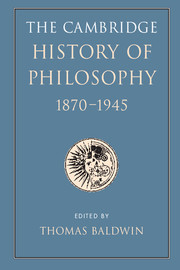Book contents
- Frontmatter
- Contents
- List of contributors
- Introduction
- I 1870–1914
- II 1914–1945
- 8 Logic and philosophy: the analytic programme
- 9 The diversity of philosophy
- 10 Knowledge, language, and the end of metaphysics
- 11 Philosophy and the exact sciences
- 12 Mind and its place in nature
- 51 Vitalism and emergence
- 52 Behaviourism and psychology
- 53 Gestalt psychology
- 54 Wittgenstein’s conception of mind
- 13 Philosophy and social science
- 14 Ethics, religion, and the arts
- 15 Law and politics
- Biobibliographical appendix
- Bibliography
- INDEX
- References
52 - Behaviourism and psychology
from 12 - Mind and its place in nature
Published online by Cambridge University Press: 28 March 2008
- Frontmatter
- Contents
- List of contributors
- Introduction
- I 1870–1914
- II 1914–1945
- 8 Logic and philosophy: the analytic programme
- 9 The diversity of philosophy
- 10 Knowledge, language, and the end of metaphysics
- 11 Philosophy and the exact sciences
- 12 Mind and its place in nature
- 51 Vitalism and emergence
- 52 Behaviourism and psychology
- 53 Gestalt psychology
- 54 Wittgenstein’s conception of mind
- 13 Philosophy and social science
- 14 Ethics, religion, and the arts
- 15 Law and politics
- Biobibliographical appendix
- Bibliography
- INDEX
- References
Summary
BEHAVIOURISM AND NATURALISM
Behaviourism was a peculiarly American phenomenon. As a school of psychology it was founded by John B. Watson (1878–1958) in 1913, and grew into the neobehaviourisms of the 1920s, 1930s and 1940s. Philosophers were involved from the start, prefiguring the movement and endeavouring to define or redefine its tenets. Behaviourism expressed the naturalistic bent in American thought, which came in response to the prevailing philosophical idealism and was inspired by developments in natural science itself.
There were several versions of naturalism in American philosophy, and also several behaviourisms (Williams 1931; O'Neil 1995). Most behaviourists paid homage to Darwinian functionalism; all forswore introspection and made learned changes in behaviour the primary subject matter and explanatory domain of psychology. Most behaviourists acknowledged that scientists begin from their own conscious experience, but denied that such experience could be an object of science or a source of evidence in psychology. They differed in their descriptions of behaviour, modes of explanation, and attitudes towards mentalistic concepts. Watson was a strict materialist who wanted to eliminate all mentalistic talk from psychology. Edward Chace Tolman (1886–1959) regarded mind as a biological function of the organism. He permitted mentalistic terms such as ‘purpose’ in behavioural description, and posited intervening processes that included ‘representations’ of the environment, while requiring such processes be studied only as expressed in behaviour. Clark L. Hull (1884–1952) developed a hypothetical-deductive version of behaviourism, akin to Tolman’s functionalism in positing intervening variables but without his cognitivist constructs. B. F. Skinner (1904–90) rejected intervening variables and developed his own account of the behaviour of the whole organism, based on the laws of operant conditioning.
- Type
- Chapter
- Information
- The Cambridge History of Philosophy 1870–1945 , pp. 640 - 648Publisher: Cambridge University PressPrint publication year: 2003
References
- 1
- Cited by



